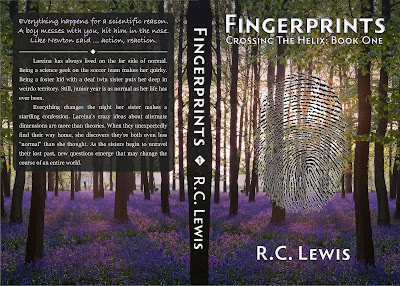September, 2010
YA Work and the Big Bad
One of the basic elements of storytelling is conflict. Most sources list between four and six main conflict types.
- Man vs. Self–the identity crisis
- Man vs. Man–“duke it out” (physically or otherwise)
- Man vs. Society–the rebellion
- Man vs. God/Fate–big-time underdog
- Man vs. Nature–the disaster scenario
- Man vs. Technology–“Good morning, Dave.”
As I look at young adult novels (particularly the sci-fi/fantasy variety I’m so fond of), Man vs. Man is certainly common, as it seems to be across the spectrum of genres. Harry Potter has Voldemort. The Mortal Instruments has Valentine. Twilight has an assortment of “non-vegetarian” vampires. (What’s with everything starting with V?) Even The Hunger Games, which is more Man vs. Society, personifies society as a whole in a single antagonist, President Snow.
Speak up:
9 commentsPlaying with Covers: Part Two
Because I don’t have enough to do (?), I started playing around with Photoshop on Thursday night. Here’s the result:
ETA: Went ahead and made a matching one for Echoes, too.
These just might be my favorites so far. See the previous versions (fronts only) here.
I still haven’t decided to self-publish, but it doesn’t hurt to be prepared, right?
Speak up:
3 commentsThat Aristotle Guy
Oops, kind of a long stretch since the last post. At first, there wasn’t much to say. Then there was, but it was more of the same (four fulls and a partial out at one point = more waiting). Finally, it was getting back to the day job, where almost everyone on campus had to relocate due to renovations.
The inspiration for today’s post comes from the day job, in fact. We had a professional development day yesterday, most of which wouldn’t interest any of you. During a presentation on critical thinking skills, though, came a moment of epiphany … and it wasn’t while my colleagues and I were trying to build a tower out of marshmallows and toothpicks.
Our presenter includes some quotations on a few of her slides, and one particularly caught my attention:
In addition to the implications for educating my little rabblerousers, it struck me as a nice summation of my philosophy on accepting critique. You have to be able to entertain a thought, even unpleasant ones, without (necessarily) accepting it. Once you entertain it, you can make that decision whether it has merit you should act on or not.
This is especially applicable to me recently, as three of my four fulls came back with rejections. One was a form rejection, so there’s nothing for me to take from it. Another was a detailed message that felt like the agent just didn’t get it–we all view things through our own lens, and hers seems to be polarized at a right angle to mine. The third was a brief but personal message that raised an interesting question.
It’s that last one that has me thinking the most. Perhaps I’ll expound on it in another post. My book doesn’t follow a certain part of the YA sci-fi/fantasy formula. I know that, and in many ways it was my whole point. So I’m trying to entertain the thought planted by that agent without accepting it, at the same time looking for what I can take from it.
Meanwhile, I’m forging ahead–working on Book Three, receiving good news on another front (see if you can spot it in my Twitter feed, post forthcoming), and wondering if I’m ever going to hear back from Agent #1.
Oh, and keeping up with the day job.

